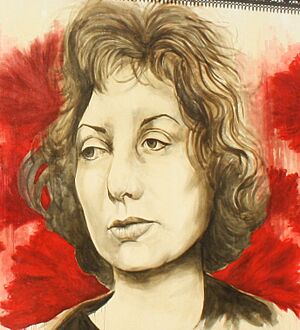Maria Teresa Horta facts for kids
Quick facts for kids
Maria Teresa Horta
|
|
|---|---|

Horta in Mulheres da Revolução de Abril (Women of the April Revolution), a 2019 mural in Vila Nova de Cerveira
|
|
| Born | Maria Teresa Mascarenhas Horta 20 May 1937 Lisbon, Portugal |
| Died | 4 February 2025 (aged 87) Lisbon, Portugal |
| Alma mater | University of Lisbon |
| Spouse | Luís de Barros (d. 2019) |
Maria Teresa de Mascarenhas Horta Barros (born May 20, 1937 – died February 4, 2025) was an important Portuguese writer. She was a feminist poet, a journalist, and an activist.
She is famous for being one of the three authors of the book Novas Cartas Portuguesas. The other authors were Maria Isabel Barreno and Maria Velho da Costa. These three women were known as the "Three Marias." In 1972, during a time when Portugal was ruled by a strict government called the Estado Novo dictatorship, they faced legal trouble. They were arrested and put on trial because of their book, which the government tried to censor.
Their book and trial became very well-known. They inspired protests in Portugal and got attention from women's rights groups around the world. This happened in the years leading up to the Carnation Revolution, a peaceful event in 1974 that ended the dictatorship.
Contents
Early Life and Writing Career
Maria Teresa Horta studied at the Universidade de Lisboa (University of Lisbon). After her studies, she worked as a journalist.
She was an active part of the Portuguese Feminist Movement. She worked closely with Maria Isabel Barreno and Maria Velho da Costa, who together became known as the "Three Marias." She was also a member of a writing group called Poesia 61.
Her writings appeared in many newspapers and magazines. Some of these included Diário de Lisboa, A Capital, República, and Diário de Notícias. She also worked as the editor-in-chief for Mulheres magazine.
In 2020, the Portuguese Ministry of Culture gave her the Medal of Cultural Merit. This award recognized her important contributions to culture. In 2021, she received the Casino da Póvoa Literary Prize for her book Estranhezas. That same year, she was honored at a special literary festival. On April 21, 2022, she was given the high honor of Grand Officer of the Order of Liberty.
Personal Life
Maria Teresa Horta's father was Jorge Augusto da Silva Horta. He was a university professor and led the General Medical Council of Portugal. Her mother was D. Carlota Maria Mascarenhas.
Maria Teresa Horta was married to Luís Barros. He passed away on November 20, 2019. They had a son named Luís Jorge Horta Barros, who was born on April 4, 1965. He is married and has two sons.
Maria Teresa Horta passed away in Lisbon on February 4, 2025, at the age of 87.
Awards and Recognition
In December 2024, Maria Teresa Horta was included on the BBC's 100 Women list. This list highlights 100 inspiring and influential women from around the world.
Works
Maria Teresa Horta wrote many books, including poetry and other types of writing. Here are some of her works:
- Espelho Inicial (1960) (poetry)
- Tatuagem (1961)
- Cidadelas Submersas (1961)
- Verão Coincidente (1962)
- Amor Habitado (1963)
- Candelabro (1964)
- Jardim de Inverno (1966)
- Cronista Não é Recado (1967)
- Minha Senhora de Mim (1967) (poetry)
- Ambas as Mãos sobre o Corpo (1970)
- Novas Cartas Portuguesas (1971)
- Ana (1974)
- Poesia Completa I e II (1983)
- Os Anjos (1983)
- O Transfer (1984)
- Ema (1984)
- Minha Mãe, Meu Amor (1984)
- Rosa Sangrenta (1987)
- Antologia Política (1994)
- A Paixão Segundo Constança H. (1994)
- O Destino (1997)
- A Mãe na Literatura Portuguesa (1999)
- As Luzes de Leonor (2011)
- As Palavras do Corpo – Antologia de Poesia ... (2012)
- A Dama e o Unicórnio (2013)
- Anunciações (2016)
Works in Other Languages
Some of Maria Teresa Horta's poems have been translated into English:
- "Seven Poems from Poesia Reunida (Collected Poetry)". Translated by Dean Thomas Ellis, The Puritan # 25 (Spring 2014 Supplement).
- Point of Honour: Selected Poems of Maria Teresa Horta. Translated by Lesley Saunders. (Two Rivers Press Ltd, 2019) ISBN: 978-1-909747-47-0
See also
 In Spanish: Maria Teresa Horta para niños
In Spanish: Maria Teresa Horta para niños
 | Claudette Colvin |
 | Myrlie Evers-Williams |
 | Alberta Odell Jones |

